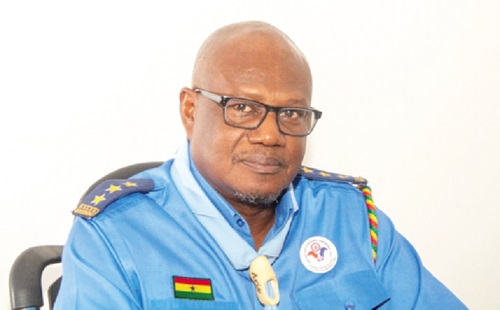
New security bosses named
President John Dramani Mahama has made key appointments to the National Security set-up, with retired Commissioner of Police (COP) Nathan Kofi Boakye as the new Director of Operations at the Presidency.
He will “oversee operational effectiveness in security matters”.
The appointments, announced via a statement signed by the acting Spokesperson to the President, Felix Kwakye Ofosu, in Accra yesterday, also had a former Chief of Staff, Prosper Douglas Bani, as National Security Advisor to the President, Deputy Commissioner of Police (DCOP) Abdul-Osman Razak as the National Security Coordinator, and Charles Kipo as the Director-General of the National Intelligence Bureau (NIB).
Credentials
Mr Bani, who also served as Minister for the Interior for a while in President Mahama’s first term, brings a wealth of experience and expertise, having worked with the United Nations in the peace-building space.
COP Boakye (retd) served the police service to the rank just below the Inspector-General of Police.
The 61-year-old lawyer also served as Ashanti Regional Police Commander during his eventful career in the service.
DCOP Razak’s role involves ensuring a cohesive strategy across all security initiatives.
The statement said the appointments were a reflection of “President Mahama's commitment to enhancing national security and ensuring the safety of citizens”.
Experts’ views
Two security experts have praised President Mahama's selection of members for the national security team, describing the appointees as well-qualified individuals deserving of their roles.
They have also underscored the need to treat the country’s internal security, particularly the conflict in Bawku, as a priority although the President is yet to make two key appointments, namely the Ministers for the Interior and Defence.
The two experts — Dr Adam Bonaa, and retired military officer, Wing Commander (WG CDR) Kwaku Kekrebesi, a retired pilot of the Ghana Armed Forces (GAF) — expressed their views on the appointments in separate interviews with the Daily Graphic.
They said it was important to de-politicise recruitment into the security agencies and make it more transparent as a policy.
Dr Bonaa described the members of the team as seasoned persons but urged members of the public to be measured in their expectations.
“Let’s be measured, and let’s give those new officers the benefit of the doubt, believing that they are going to get it right for all of us,” he said.
Dr Bonaa further added that primary security challenges such as youth unemployment, chieftaincy disputes, political hooliganism and the land guard culture should be high on the government’s agenda.
WG CDR Kekrebesi described the appointment team as a good mix, adding that “the President chose from civilian, police and military, so it is a good mix and I fully support it because the bird’s eye view is different but they all collectively enhance the security of the people”.
“I am very pleased with the way the President has started, and I think with this new appointment, we should be safer than before,” he stressed.
Bawku approach
On the government’s effort to tackle the Bawku conflict, Dr Bonaa commended the President’s presence in the area, saying it was reassuring.
He added that measures such as military and police interventions were insufficient and short term.
To be able to effectively tackle the Bawku conflict sustainably, he said there was the need to use dialogue and more conflict resolution strategies to restore calm.
For WG CDR Kekrebesi, he said, the government could adopt the same strategy used to resolve the Dagbon conflict in handling the Bawku conflict.
“Finally, the security team must help the President to implement the Operation Recover All Loot (ORAL) campaign to recover every loot of state resources,” WG CDR Kekrebesi added.
